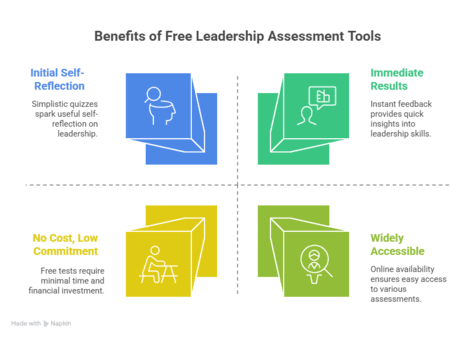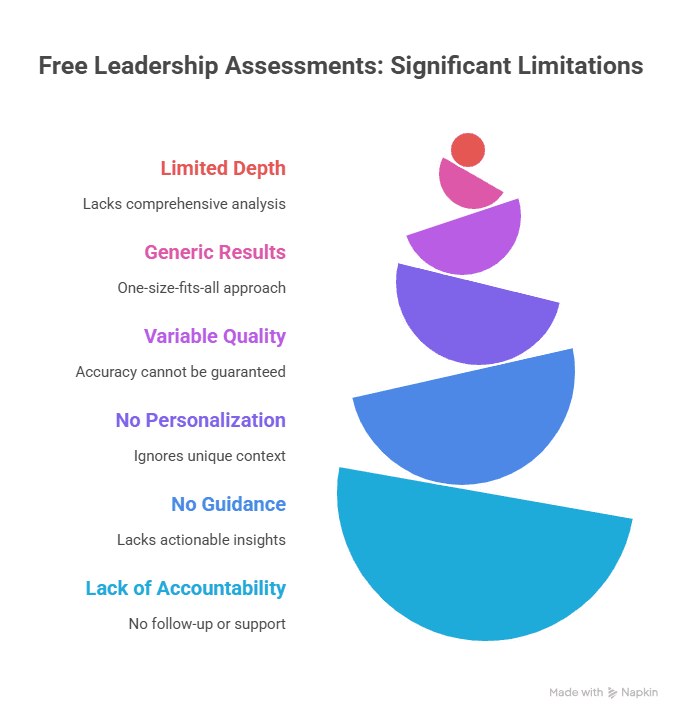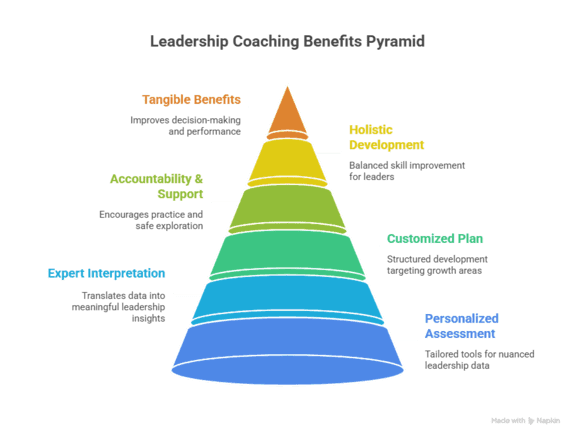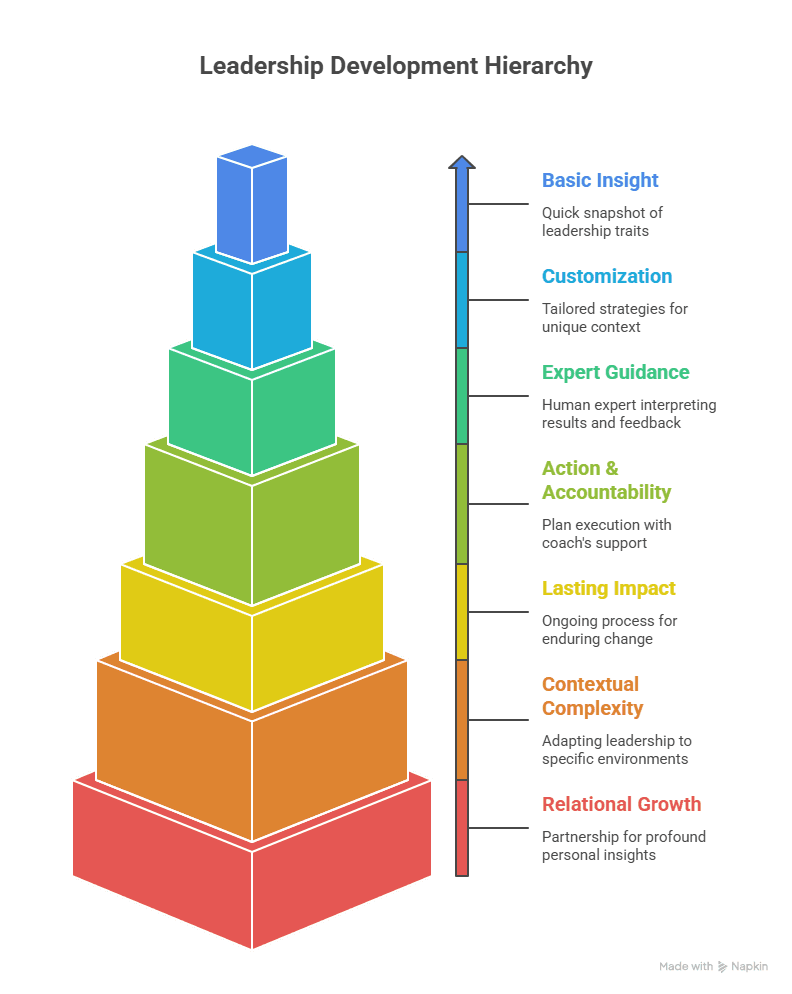Free Leadership Assessment Tools vs. Professional Coaching: What’s the Difference?

Many aspiring leaders search for leadership assessment tools or take a free leadership test online to gauge their skills and potential. It’s easy to see the appeal – these quizzes promise quick insights into your leadership style or strengths at no cost. On the other hand, some professionals opt for a comprehensive leadership coaching program with a seasoned coach for deeper development. So, leadership assessment vs coaching – which approach is right for you? In this post, we’ll compare the benefits and limitations of free online leadership assessments versus working with a professional coach. Understanding the difference will help you decide whether a free leadership assessment quiz is enough for your needs or if investing in professional coaching could unlock greater growth.
Free Leadership Assessment Tools: Quick and Easy Insights
Free leadership assessment tools are typically online quizzes or self-assessments offered by various websites, consultants, or organizations. These might include leadership style quizzes, personality tests, or short questionnaires rating your leadership skills. Free leadership assessments are widely available online from many sources and are very easy to access. Because they are free and usually take only a few minutes, they provide a low-risk way to get basic feedback on your leadership qualities. For someone at the early stages of their leadership journey, a quick quiz can offer initial clarity about your leadership style or potential. In other words, these tools can serve as a convenient starting point for self-reflection.
Benefits of Free Leadership Assessment Tools
- No Cost, Low Commitment: The obvious advantage is that they cost nothing but a few minutes of your time. This makes them low-risk options for anyone curious about their leadership skills. You can take a free leadership quiz on a lunch break and get instant results without any financial investment or scheduling effort.
- Immediate Results: Most free assessments provide results or a summary report right away. There’s no waiting for feedback – you get instant gratification and quick insights into aspects like your leadership style, strengths, or areas to improve. They can be a fun, fast way to learn something about yourself.

- Good for Initial Self-Reflection: If you’re new to leadership development, a free test can jump-start your thinking. In fact, even simplistic quizzes can spur useful self-reflection and introduce basic leadership concepts. For example, you might learn about different leadership styles (autocratic vs. democratic, etc.) or evaluate your communication skills for the first time. This initial awareness is a positive first step, providing a foundation for more nuanced exploration later.
- Widely Accessible: You can find countless free leadership tests with a quick web search (e.g. “best free leadership assessment”). From university websites to consulting firms, many offer these tools as resources or lead magnets. The variety means you can try different assessments focusing on personality, emotional intelligence, management skills, and more – all at no cost. Because they’re online, you can take them anytime, anywhere.
Free online leadership assessments are often short quizzes that provide quick feedback. They usually involve answering questions or rating yourself on various leadership traits, with the promise of a personalized report at the end. These tools are great for getting a quick snapshot of your leadership style or skills, especially if you’re just starting out. However, as convenient as they are, it’s important to recognize that a brief quiz can only scratch the surface of something as complex as your leadership ability.
Limitations of Free Leadership Assessments
While free tools have their place, they come with significant limitations. It’s important to be aware of what free leadership assessments cannot do or where they might even mislead you:
- Limited Depth and Detail: Free leadership assessments tend to be far less comprehensive than paid assessments or professional evaluations. They usually consist of a short questionnaire with generic feedback. As a result, they provide only a surface-level analysis. You might get a high-level label like “You are a Visionary Leader,” but not a deep dive into your specific competencies or blind spots. In contrast, robust assessments (often used by professionals) ask more in-depth questions and provide richer data.

- Generic Results (One-Size-Fits-All): Many online quizzes use broad categories or cookie-cutter descriptions that sound personal but could apply to almost anyone – a phenomenon known as the Barnum effect. By presenting you with flattering or vague leadership archetypes (“Visionary,” “Coach,” “Pacesetter,” etc.), these assessments create a sense of recognition without delivering genuine insight. The fundamental flaw is a reductionist approach: they try to compress a multi-dimensional skill set into a single label or type, which oversimplifies the complex nature of real leadership. In reality, effective leadership is highly contextual and not easily captured by a simplistic quiz result.
- Variable Quality and Accuracy: The reliability of free tools can be hit-or-miss. Since anyone can publish a “leadership test” online, not all are created by experts or based on solid research. The quality and accuracy of data from free assessments can vary widely, raising concerns about how much you should trust the results. Inaccurate or poorly designed tests might give you misleading feedback, which in turn could lead you to focus on the wrong areas for development. For example, a free test might score your strategic thinking as “poor” based on a few odd questions – when in reality that may not be an accurate reflection of your ability. Without knowing the test’s validity, it’s hard to know what to truly take away from the results.
- No Personalization to Your Context: Free assessments are generic by nature – the same set of questions and formula is given to everyone. They can’t account for your unique situation, role, or industry. If you have specific leadership challenges or organizational goals, a one-size-fits-all quiz won’t adjust to those needs. Free tools also lack customization options, which means they may be of limited use if you or your company have specific development priorities that fall outside the quiz’s narrow scope. In contrast, professional assessments can be chosen or tailored to align with your organization’s leadership competencies or your personal goals.
- No Guidance or Action Plan: Perhaps one of the biggest drawbacks is that you’re on your own once you get the results. A free online report might tell you what your leadership style is or where you scored low, but it rarely tells you why or how to improve in a meaningful way. There is no human coach to interpret the nuances or answer your questions. The tools typically do not provide a structured action plan beyond a few generic tips. So while you might gain some insight, you’re left without clarity on what to do with that information to actually grow as a leader.
- Lack of Accountability: Because free assessments are a solo activity, there’s no accountability or follow-up. You might read the results, think “interesting,” and then carry on with business as usual. There’s no one to ensure you act on any of the findings or to help you track progress. Real change often requires sustained effort and someone to hold you accountable – something a static quiz cannot offer.
It’s worth noting that despite these limitations, free leadership quizzes aren’t completely without value. They can be an okay starting point to stimulate reflection or introduce basic concepts. However, as one leadership expert put it, no online quiz can capture the full complexity of your leadership or drive real improvement on its own. To go from simple self-awareness to true development, you’ll likely need more robust methods and support.
What Professional Leadership Coaching Offers
If free tools are like dipping a toe in the water, professional leadership coaching is diving into the deep end of personal development. Leadership coaching involves working one-on-one with a trained coach (often over a period of months) to assess and improve your leadership capabilities. Coaches often begin by using formal assessment instruments – for example, well-researched leadership questionnaires, 360-degree feedback surveys, or personality profiles – to get a clear picture of you as a leader. But they don’t stop at just giving you a report; a coach will interpret the results with you and then guide you through a tailored development plan.
In essence, coaching provides a comprehensive, customized approach to your growth. When you engage in a professional coaching program, the tools and process are tailored to your particular needs, ambitions, and priorities, ensuring the insights you gain are meaningful and relevant. A good coach will take into account your role, your organization’s context, and your specific goals (like preparing for a bigger role, improving team management, or overcoming certain blind spots). Leadership coaching is most effective when it’s highly personalized and aligned with your current and future needs – something no generic online quiz can replicate.
Let’s break down some key elements and benefits of professional coaching, especially as they compare to the free-tool experience:
Benefits of Professional Leadership Coaching
Personalized and In-Depth Assessment: Unlike a generic quiz, coaching typically starts with rigorous assessment that is chosen or designed for your situation. This could include validated leadership assessments (e.g., a 360° feedback tool or instruments like Hogan, DISC, etc.) and in-depth interviews or surveys involving your colleagues. These assessments provide nuanced data on your behavior and impact, far beyond the surface-level results of a free test. For example, a 360-degree feedback process gathers input from your peers, direct reports, and bosses to paint a full picture of how you lead – strengths and weaknesses – in the eyes of others. The result is a much richer, more accurate baseline of your leadership effectiveness. Moreover, a leadership development company or coach will select tools that align with your goals and make sure you get information you can actually use. This tailored approach ensures the feedback is directly relevant to your growth.

- Expert Interpretation and Feedback: Getting data is one thing; understanding it is another. A professional coach acts as a knowledgeable guide who can interpret your assessment results and translate them into meaningful insights. They will help you see patterns or root causes that a raw score alone might not reveal. For instance, if an assessment indicates you have low scores in delegation and team empowerment, a coach can discuss specific incidents behind that, helping you realize perhaps trust issues or perfectionism are holding you back. This level of interpretation is something automated online results cannot provide. The coach will also give you candid, constructive feedback in real time. This human element is crucial – you have someone to ask questions, explore your reactions, and clarify doubts. As a result, you gain a much deeper understanding of yourself than you would from reading a generic report on your own.
Professional leadership coaching typically involves personalized guidance and in-depth feedback. In the image, a leadership coach and client review detailed assessment results together – a step beyond getting an impersonal email report. A coach can explain the data, answer questions, and provide context on what those charts and numbers mean for you. This collaborative review ensures that you not only know your results, but truly understand their implications. With a coach’s help, the focus shifts from just knowing your leadership style or scores to developing a concrete plan for improvement based on those insights.
- Customized Development Plan: After analyzing where you stand, a coach works with you to create a structured development plan targeting your growth areas and goals. This plan is highly customized – it might involve specific skill-building activities, new leadership behaviors to practice on the job, learning resources, and milestones to hit. Crucially, the plan is aligned with real challenges you face in your role or aspirations you have for the future. Professional coaching programs emphasize actionable development steps and continuous learning. For example, if public speaking and executive presence are identified as areas for growth, your coach might have you deliver a presentation and then debrief on it, or practice specific techniques in your sessions. This kind of structured, goal-oriented approach is a stark contrast to the one-and-done nature of an online quiz result.
- Accountability and Ongoing Support: One of the major benefits of leadership coaching is the built-in accountability. Your coach becomes a partner in your progress – someone who will check in on your commitments, encourage you, and hold you accountable for practicing new skills or behaviors. The ongoing, regular conversations with a coach keep you engaged in your development over time, which is often what’s needed to create real change. Through these focused sessions, coaching improves self-awareness and challenges assumptions that might be limiting your growth. Moreover, the coach provides a psychologically safe environment where you can openly discuss difficulties and failures without judgment. This level of trust and accountability is something a free assessment simply doesn’t offer. Professional coaching creates accountability for behavior change and a safe space to explore leadership blind spots – things that self-assessments rarely reveal on their own.
- Holistic Skill Development: Free assessments might tell you a static “you are X type of leader.” Coaching, however, treats leadership as a set of skills and behaviors that can be learned and improved. A coach will help you work on a variety of competencies – from strategic thinking to emotional intelligence to conflict management – in a balanced way. Over the course of coaching, you can build on your strengths and address your weaknesses in a systematic manner. For current leaders, coaching often highlights subtle areas like emotional intelligence or self-awareness deficits that need development. For aspiring leaders, coaching helps develop their leadership style, prepare for real-world challenges, and strengthen both hard and soft skills. This holistic development is far more extensive than what you’d typically gain from a few quiz insights.
Tangible Performance Benefits: Ultimately, the goal of coaching is to make you a more effective leader and drive better results in your career or organization. And there’s evidence it works – studies have found that effective coaching can improve decision-making, people management, and overall leadership performance. In fact, 86% of companies report a positive return on investment from leadership coaching. Leaders who undergo coaching often become more adept at navigating complex situations, understanding their blind spots, and leading teams to higher performance. These are outcomes that go well beyond what any one-off assessment can achieve. Coaching is an investment, but when done right, it yields significant benefits in terms of agility, engagement, and even bottom-line results.
Free Leadership Assessment vs. Professional Coaching: Key Differences
It’s clear that taking a free quiz and engaging in coaching are vastly different experiences. Here’s a direct comparison of leadership assessment tools vs coaching to highlight what each offers:
- Scope of Insight: A free tool provides a quick snapshot of your leadership traits; coaching provides a deep dive into your leadership identity, drawing from multiple data points (self-assessment, 360 feedback, etc.) for a well-rounded view. The depth of information from coaching is far greater and more nuanced.
- Customization: Free assessments are one-size-fits-all – the same formula for everyone. Professional coaching is tailored to you – from the choice of assessment tools to the development strategies used, everything aligns with your unique context and goals.
- Expert Guidance: With a free test, you get an automated result and you’re on your own. With coaching, you have a human expert guiding you. The coach can interpret results, provide feedback, and answer questions in a way no algorithm can. This guidance turns raw data into meaningful improvement.

- Action and Accountability: A quiz might tell you what your leadership style is, but it won’t change your behavior. Coaching translates insight into action – you come away with a plan and someone to hold you accountable for executing it. Over time, the coach helps ensure you practice new skills and adjust as needed, so real growth happens.
- Duration of Impact: Free assessments are typically a one-time event – a momentary insight. Coaching is an ongoing process that unfolds over weeks or months, leading to cumulative learning and lasting change. The impact of coaching tends to be deeper and more enduring because it involves repetition, reinforcement, and adaptation.
- Context and Complexity: Real-world leadership is complex and situational. Free assessments usually ignore context, offering generic advice, whereas coaching embraces your context. Through coaching conversations, you’ll explore how to lead effectively in your specific environment (your team dynamics, organizational culture, industry challenges, etc.). This makes the learning highly relevant and practical. As research has shown, effective leadership isn’t about fitting a static category; it’s about adapting to context – something coaching is designed to develop.
- Results vs. Relationship: Finally, taking a test is transactional – you get a result. Coaching is relational – you build a partnership with someone devoted to your growth. The trust and rapport in a coaching relationship often lead to profound personal insights and breakthroughs that a self-serve assessment simply can’t facilitate. A professional coach acts as a thought partner and sounding board as you navigate challenges and changes, providing support that goes beyond what any assessment report could offer.
In summary, free leadership assessments and professional coaching differ in almost every dimension: depth, personalization, guidance, and impact. Free tools can tell you a little bit about yourself with minimal effort, whereas coaching can transform how you lead through sustained, guided development.
Choosing the Right Path for Your Leadership Development
So, what’s the best route for you? The choice between using free assessment tools and investing in professional coaching depends on your current needs, budget, and how far you want to go in developing your leadership capacity.
If you’re simply curious about where you stand, or you’re just starting to explore leadership development, taking a free leadership assessment or two is a fine starting point. It’s quick, it’s easy, and it can provide some food for thought. For example, if you’re a new manager wondering about your leadership style, a free test might give you a general sense (“Okay, I lean toward a coaching style of leadership.”) and some initial tips. This can be a gentle introduction that gets you thinking about your strengths and areas to improve. In fact, many coaches and experts acknowledge that these quizzes, while limited, can spark valuable self-reflection for people who have never formally assessed their leadership before.
However, if your goal is to substantially grow and improve as a leader – especially if you have high-stakes objectives like advancing to an executive role, turning around a team, or addressing serious challenges – a free quiz will not be enough. Consider what’s at risk if you rely solely on simplistic tools: you might get an incomplete or even inaccurate picture of your abilities, potentially leading you to focus on the wrong things. More importantly, you won’t have the support needed to actually change your behavior or mindset in a lasting way.
This is where professional coaching becomes worth the investment. By working with a coach, you’re ensuring that you get a thorough, evidence-based assessment of your leadership (often using reputable tools) and, crucially, that you do something productive with that knowledge. The coach helps you bridge the gap between insight and action – turning awareness into improved skills, new habits, and better results. If you’re serious about career development or overcoming leadership hurdles, coaching offers a high-value path to get there. The ROI can be significant, not just in terms of business metrics or career opportunities, but also in your personal growth and confidence as a leaderskylineg.com.
Finally, it’s worth mentioning that free vs. professional doesn’t have to be an either/or forever. You might start with free tools, then decide to engage a coach once you hit a plateau or crave more depth. Even during a coaching engagement, you might use occasional free self-assessments as supplemental reflections between sessions. The key is to recognize their role: free assessments are like a snapshot, whereas coaching is the full journey. If you find yourself continuously Googling for the “best free leadership assessment” and not gaining new insights, that might be a sign you’re ready to level up to a more comprehensive approach.
Conclusion: Deeper Insight vs. Quick Hints
Free leadership assessment tools can be compared to looking at your reflection in a small mirror – you get a glimpse of yourself, which is better than nothing, but you might only see part of the picture. Professional coaching, on the other hand, is like having a personal trainer for your leadership; it holds up a 360° mirror and then helps you build the muscles needed to grow. Free tools have undeniable convenience and can kick-start your development, but their benefits are limited to surface-level insights. To gain a complete understanding of your leadership abilities and truly improve upon them, there is no substitute for the depth of a personalized coaching experience.
At the end of the day, investing in professional coaching means investing in yourself. The difference between a short quiz and a comprehensive coaching program is the difference between information and transformation. One gives you data, the other drives change. If you’re aiming for meaningful growth as a leader – the kind that advances careers and enables teams to thrive – consider taking that step beyond free assessments. LeadersAdapt’s own coaching programs, for example, incorporate comprehensive leadership assessments, one-on-one expert feedback, and tailored development plans to ensure you get actionable insight – not just a score on a webpage. While a free quiz might tell you what your leadership style is, a great coach will show you how to elevate it. And that can make all the difference in your leadership journey.
FAQ's
Are free leadership assessment tools accurate?
Free tools can spark useful self-reflection, but quality varies and insights are often surface-level. Use them as a start, not a final diagnosis.
What are the benefits of leadership coaching vs assessments?
Coaching pairs validated assessments with expert interpretation, a tailored plan, and accountability—turning insight into sustained behavior change.
When should I choose coaching over a free leadership test?
If you’re preparing for promotion, leading bigger teams, or need targeted growth with real-world impact, coaching is the higher-ROI path.

I’m an executive advisor and keynote speaker—but before all that, I was a tech CEO who learned leadership the hard way. For 16+ years I built companies from scratch, scaled teams across three continents, and navigated the collision of startup chaos and enterprise expectations.